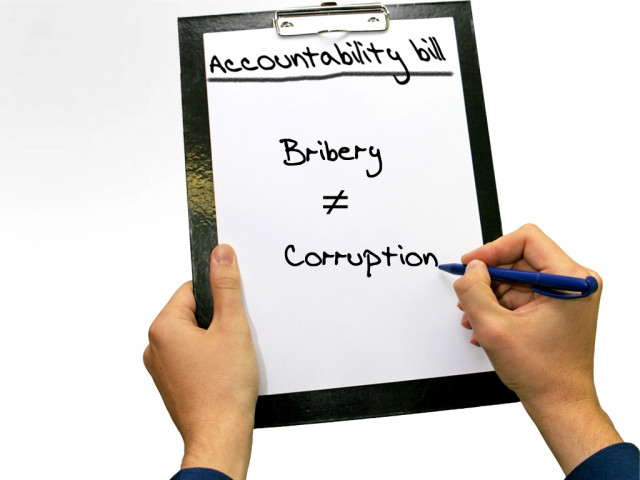Keeping watch: Holding the Accountability Commission accountable
Draft aims to empower body with financial and administrative independence.

The initial draft is expected to be tabled before the K-P Assembly in its session in the coming week. DESIGN: SUNARA NIZAMI
The Khyber-Pakhtunkhwa (K-P) Accountability Commission (AC) will have financial and administrative independence from the executive to insulate it from political interference.
An official summary of the draft available with The Express Tribune details the mechanics behind the Accountability or Ehtesab Commission and its formulation. Numerous checks and balances will be put in place to prevent abuse of authority by the commission itself.
The initial draft is expected to be tabled before the K-P Assembly in its session in the coming week.
“It has been drafted with the aim to combine best international practices ... from other jurisdictions with lessons learnt from the practice of accountability laws and institutions within Pakistan,” states the document. It also lays down the aim of creating a law which leaves little room for “subordinate legislature to water down [the Ehtesab Commission’s] provisions.”
Holding ‘public officials’ accountable
The AC is expected to have a wide ambit, excluding the military and judiciary.
It can hold accountable any person with a legislative, executive or administrative position in the province, regardless of seniority, remuneration or permanence of position. Anyone who performs a public function, whether for a public enterprise, foreign-funded programme or any entity utilising public revenue along with any person or entity controlled by the K-P government can be examined by the AC.
Corrupt for me or corrupt for you?
The document describes at some length what acts can constitute as “corrupt practices”. It broadly defines “gratification” as a favour or service provided to a person – such as money, gifts and/or advantage “of any description whatsoever”.
Exercising authority on any occasion other than when it is merited or failing to exercise authority in accordance with the law to benefit a situation is also deemed as corrupt practice.
The penalty box
Fines (up to Rs10 million) and imprisonment (up to 14 years) are potential punishment for corruption. The AC cannot prescribe any punishment more stringent than federal laws as those accused under the Accountability Commission could argue the right to trial under a more lenient law.
Choosing the best
A 10-member K-P Assembly Committee on Governance and Accountability will first choose members of a Search and Scrutiny Committee – the latter will go on to nominate the Accountability Commission members.
The Search and Scrutiny Committee will have seven members – at least one woman. The seven members will be one of each of the following: retired civil servant of grade 22, social worker, business community representative, former professor or vice chancellor, retired judge of the supreme or high court; senior journalist and credible overseas Pakistani.
None of the members can be in service, members of a political party or be domiciled outside of K-P. They will serve a single tenure of four years without compensation.
Rank and file
On August 19, Minister for Information Shah Farman explained the Accountability Commission would constitute a director general, a prosecutor general, and five accountability or ehtesab commissioners.
The director general will be appointed by the AC for a single four-year tenure.
The accountability commissioners will be responsible for policy on corruption and will oversee policy implementation as well as the operation of the Directorate General of the Accountability Commission. They will also oversee the budget and the rules of the commission.
Jurisdiction and trial
The director general of the commission has the right to decide jurisdiction – whether any other agency needs to be coordinated with or be handed jurisdiction to.
The director general may take suo motu notice of corruption or entertain public complaints as well as those lodged by the government.
The commission reserves the right to decide whether legal action will be instigated. Once it is, the accused has the right to know the nature of the accusation against them, to adequate legal representation and the right of appeal.
Cases have to be disposed of within two months.
Published in The Express Tribune, September 6th, 2013.













COMMENTS
Comments are moderated and generally will be posted if they are on-topic and not abusive.
For more information, please see our Comments FAQ